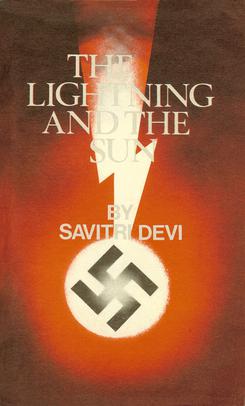The Lightning and the Sun
1958 philosophy book by Savitri Devi From Wikipedia, the free encyclopedia
The Lightning and the Sun is a 1958 book by Savitri Devi, in which the author outlines her philosophy of history along with her critique of the modern world. The book is known for the author's claim that Adolf Hitler was an avatar of the Hindu God Vishnu. It was the first book to espouse esoteric Nazism.
 Cover of the 1979 edition | |
| Author | Savitri Devi |
|---|---|
| Language | English |
| Subject | Philosophy of history Esoteric Nazism |
| Published | 1958 |
| Publication place | United Arab Republic |
| Media type | |
| Pages | 432 |
Summary
Summarize
Perspective
Begun in 1948, completed in 1956, and first published in 1958 in Calcutta, she said it "could be described as a personal answer to the events of 1945 and of the following years." It is dedicated "To the godlike Individual of our times; the Man against Time; the greatest European of all times; both Sun and Lightning: Adolf Hitler, as a tribute of unfailing love and loyalty, for ever and ever."[1] It opens with quotations from The Bhagavad Gita and Rudolf Hess.
In The Lightning and the Sun, Devi attempts to weave Nazism with a cyclic view of history,[2] arguing that time begins with a Golden Age and gradually decays through a Silver Age and Bronze Age into a final Kali Yuga, or Dark Age. She elucidates her concept of "Men in Time," "Men above Time," and "Men against Time" using the lives of Genghis Khan, Akhnaton, and Adolf Hitler respectively. Genghis Khan is used as an example of a "Man in Time" who exhibits Lightning (destructive) qualities and furthers historical decay. Akhnaton is used to illustrate a "Man above Time" who exhibits Sun (creative/life-affirming) qualities and seeks to transcend the process of historical decay. The book claims that Adolf Hitler was an avatar of the Hindu God Vishnu.[3]
Hitler is used to illustrate a "Man against Time" who exhibits both Lightning and Sun qualities (destructive power harnessed for a life-affirming purpose) and seek to fight historical decay by using violent, Dark-Age methods to achieve a Golden Age state of existence.[4] In the final chapter of the book, Savitri Devi expands further upon her cyclic view of history and argues that at the end of the Dark Age, Kalki will appear and usher in a new Golden Age.
Publication
Originally published in 1958 as a self-published samisdat, an abridged version was published by the far-right National Vanguard Books. Resistance Records, a neo-Nazi and white separatist record label, released an audio recording of readings from the book. An unabridged version was also made available online by the Savitri Devi archive. Most recently, an unabridged version was published by the white nationalist Counter-Currents Publishing.[5] The cost of producing the book (as well as Pilgrimage) was covered by Devi's job as an interpreter.[5]
The response among readers of National Socialist World (a periodical of the neo-Nazi World Union of National Socialists group) to the book was enthusiastic, resulting in William L. Pierce including more of her writings later.[5]
Legacy and analysis
Alexandra Minna Stern described the book as Devi's "most well known and far-fetched work", and as "more a mystical treatise than a narrative interpretation of the rise and fall of the Third Reich".[6] It was the first book to espouse esoteric Nazism.[citation needed]
According to Benjamin Teitelbaum, when he was in discussion with Steve Bannon, Bannon used the term that originates in this book, "Man in Time", to describe Donald Trump.[7]
References
External links
Wikiwand - on
Seamless Wikipedia browsing. On steroids.
